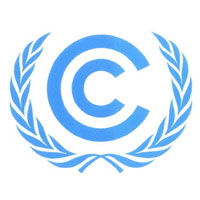
| Paris Climate Talks 2015 - Week One Ends | 6 December 15 |

The international response to climate change began at the Rio Earth Summit in 1992, where the 'Rio Convention' included the adoption of the UN Framework on Climate Change (UNFCCC). This convention set out a framework for action aimed at stabilising atmospheric concentrations of greenhouse gases (GHGs) to avoid "dangerous anthropogenic interference with the climate system." For the first time in years of UN negotiations, the EU aims to achieve a new legally binding and universal agreement on climate at COP21 in Paris. France, as host & chair for COP 21, is responsible for delivery of a consensus agreement by December 10, 2015. Current key issues at COP 21 defining negotiations for language in a new climate agreement include civil rights, indigenous rights, the actual temperature goal to aim for, and the role of 'non parties' who do not sign a new UN agreement. These include cities, non government organizations, and sub national provinces, states, countries, etc.
Visit COP 21 website |
|
 Print version Print version |
Top |
